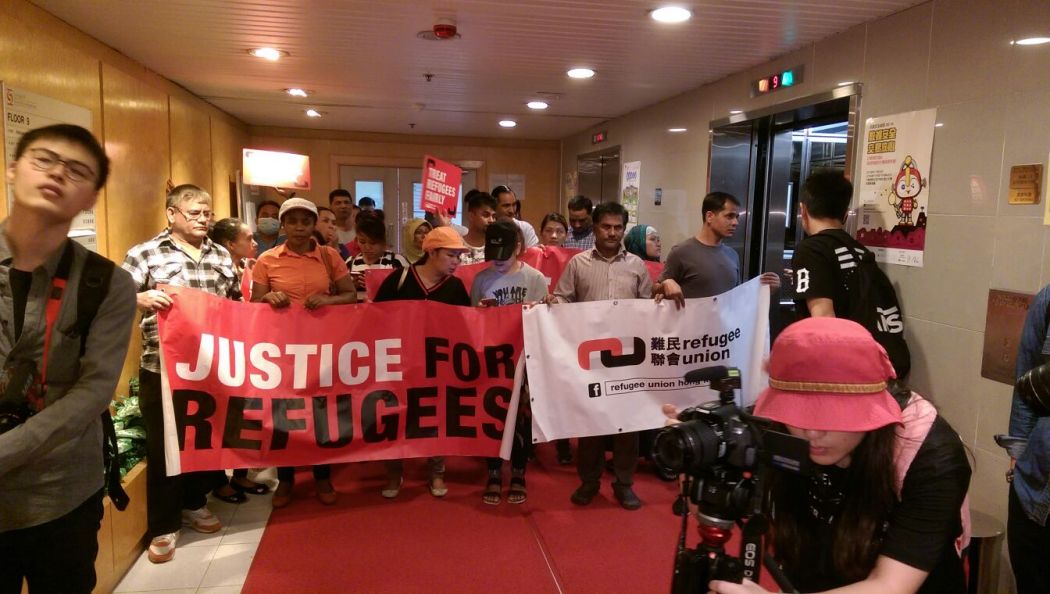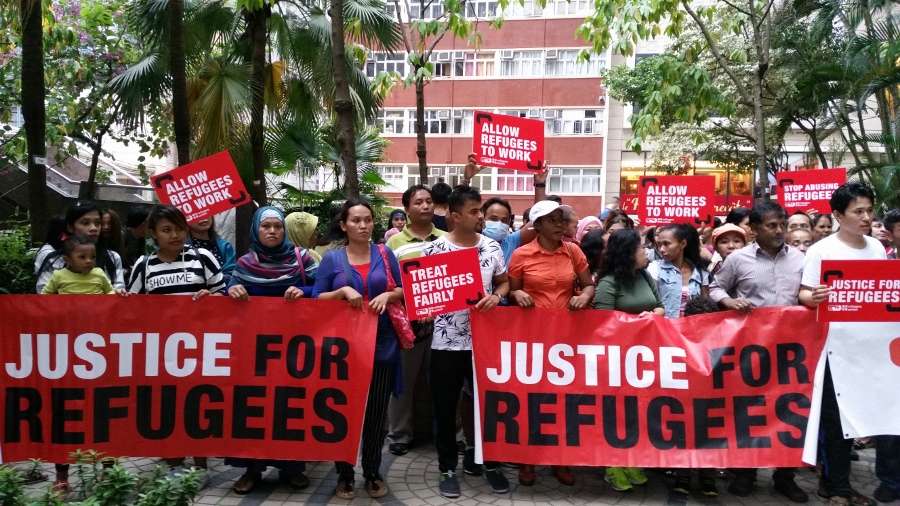Around a hundred refugees marched to the Social Welfare Department on Monday to pressure the government to increase assistance levels. They also protested a rental assistance policy that requires a guarantor to renew tenancy agreements exceeding the monthly allotment.

Under current laws, refugees are not permitted to work or volunteer. They must subsist on HK$1,500 per month for rent, HK$1,200 for food, and about HK$500 for utilities and transport. Children are allotted HK$750 for housing.
The Union delivered a petition to the Social Welfare Department last week asking the government to cover the rent and utility bills of refugees, increase the value of monthly food coupons to HK$2,000, and provide a separate coupon for diapers, among other requests.
“We wanted an assurance from the government that our welfare problems are being looked into with a view to address[ing] them. We have written four times since July this year yet nothing tangible has come out of it,” Peter Maina, secretary general of the Refugee Union, told HKFP.
A spokesperson from the Social Welfare Department said one of their staff spoke to the protesters and listened to their concerns. The department will send the Refugee Union a written response, she said.
Housing assistance policy
The Union raised another issue on Monday after receiving complaints from its members. They said that the International Social Service Hong Kong Branch – an NGO entrusted with providing assistance to refugees by the government – is refusing to provide refugees with their housing allowance unless refugees provide a letter from a guarantor saying that the guarantor will pay for rent requirements that exceed the monthly assistance provided by the government.

“This is a huge challenge as it’s next to impossible to get guarantors who are willing to make such commitments to the refugee community,” Maina said. “This has resulted in many being rendered homeless as ISS Hong Kong does not pay the rental assistance to the landlords.”
Stipend ‘adequate’
A spokesperson from ISS HK told HKFP the organisation understands the difficulty refugees may have in obtaining a local guarantor, and that guarantors overseas such as friends or family back home, and guarantees from organisations are also accepted. The policy has always been in place, and the purpose is to give assurance to landlords, which the ISS pays directly, she said.
For ISS HK to shift the burden of rent from the government to guarantors is in breach of legal requirements that the government should meet the basic needs of refugees, said Maina.
The spokesperson from ISS said that the policy shouldn’t leave refugees homeless and that the stipend is adequate for covering the basic needs of refugees if they rent with others.
“Since the government has set this amount, it should meet their basic living criteria in Hong Kong,” she said, explaining that ISS will help them find housing with other refugees if they cannot find suitable housing on their own.
“We hope to give them basic assistance, and we don’t want it to affect their lives if it’s too much or too little – if it’s too much, will it create a magnetic effect, causing more people to come? These are also the concerns of the Social Welfare Department.”

However, the Refugee Union’s petition letter last week said that the current levels of assistance remain inadequate to meet their needs.
“The current levels of assistance have been designed to ensure we refugees are destitute at all material times. Such conditions have been designed to compromise our physical and psychological well-being. This system of control thus compromises us to the extent that some refugees embark onto self-remedies such as illegal work, theft, etc. in order to pay for food and rent putting their liberty rights at risk. ”
Last week, lawmaker Holden Chow of the Democratic Alliance for the Betterment and Progress of Hong Kong (DAB) submitted a motion to the Legislative Council to combat supposed “bogus refugees,” which will be discussed at the meeting on November 30.
